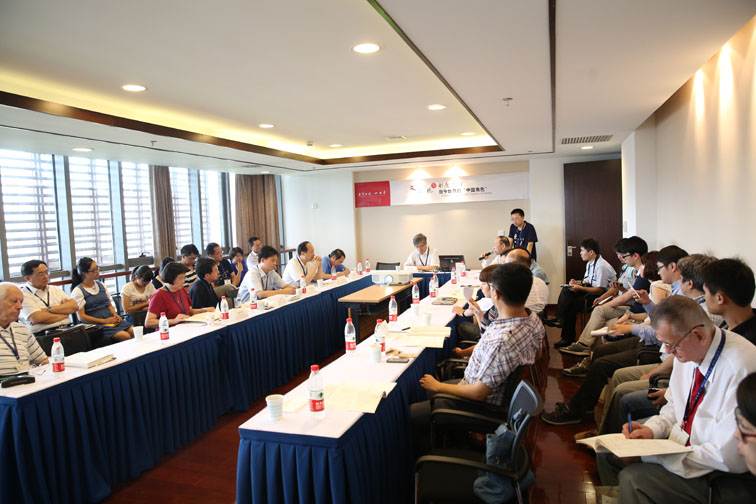The Fourth World Conference on Sinology was held in RUC
2016-09-09

On September 6th, the Confucius Institute Headquarters/Hanban, and Renmin University of China co-hosted the opening of the fourth World Conference on Sinology on RUC campus. Vice Premier Liu Yandong attended the opening ceremony and subsequently welcomed the foreign Sinologists. This conference marks the 10th anniversary of the founding of Confucius Institute, with over 200 scholars of varying disciplines coming from 38 different countries and regions to discuss and exchange views on Sinology.
Vice Premier Liu Yandong began her speech by noting that China has a long history of cultural exchange, especially in the past 400 years, that includes mutually beneficial foreign trade and the blending of customs and cultural traditions. This group of prominent Sinologists further promotes cultural exchange, which encourages wisdom and strength among the human civilization. She expressed that a new era is forming that will allow the prosperity and development of Chinese culture to contribute to the rest of the world and make the world a more interesting place as a whole.
She continued by explaining that the world is seeing unprecedented interdependence between countries, deepening the role that Sinology and the understanding of foreign cultures plays, while also enhancing the importance of friendly cooperation among countries. She hopes that cooperation between foreign and Chinese scholars will continue to increase as the Confucius institute strives to pursue Sinology research and uncover more great Chinese works in order to share Chinese culture. Investing in such cultural changes not only helps the rest of the world understand China, but also helps China’s development of overseas friendships and foreign relations. This will contribute to the elimination of prejudice and cultural misunderstanding, as well as build towards peace and harmony across the globe.

Minister of Education, Yuan Guiren, Deputy Secretary-General of the State Council, Jiang Xiaojuan, Vice Minister of Education, Hao Ping, Director General of Hanban, Xu Lin, Chairman of RUC University Council, Jin Nuo, President of the International Federation of Philosophical Societies, Dermot Moran, President of the International Comparative Literature Association, Hans Bertens, University of Paris-Sorbonne (Paris IV)President Barthélémy Jobert, Harvard University Professor Ezra Vogel, Russian National Academy of Sciences Professor Vladimir Myasnikov, as well as more than 30 diplomatic envoys and representatives attended the opening ceremony, with Renmin University President Chen Yulu presiding.
In his speech, Sorbonne President Jobert said that Sinology researchers all have personal stories and relationships with China, which actually forms the basis of Sinology by engaging not just other Sinology experts, but also the citizens of China itself. China is one of the most important countries in the world, with Chinese civilization being one of the world’s most ancient. Researching Asia and specifically China, but at the same time having an understanding of the West and its relationship with China, ultimately helps Sinologists promote a better understanding among all people of our relation to one another.
Professor Vogel’s speech pointed out that the Confucius Institute and other cultural institutions around the world have helped spread Chinese culture by giving foreigners the opportunity to learn Chinese in a beneficial environment. He himself has an attitude of “life-long learning” and will always continue his pursuit of cultural understanding. He said that foreign Sinologist have a similar dream for Sinology – to expand the cultural exchanges and strengthen Sinology research so that the rest of the world can better understand China, and so that China can better understand the rest of the world.
The 4th World Conference on Sinology with the theme of “The Exchange of Learning between ‘East’ and ‘West’: 400 Years in Retrospect”, features interpretations from both China and the outside world on the impact and influence that this historical two-way cultural communication has had on China’s development. Many topics are being covered such as Inter-Interpretation of Classical Texts and Oriental-Occidental Civilizations, Cultural Communication and Mutual Impact, Formulation of Culture and Translation of Canons, Cultural Traditions and Diverse Systems, and The Language of Comparison. Following the third world conference on “New Sinology,” this conference aims to continue to expand the outreach of Sinology across different cultural, political, and economic spheres through a retrospective analysis of these exchanges between the East and the West over the past 400 years.
According to reports, the scale of this year’s overseas participants is not only higher than ever, but also composed of more research backgrounds than ever, including traditional and emerging Sinology and covering multiple disciplines such as history, philosophy, classical translation, international relations, Sino-Western economics, and more. The conference also features the “Forum for Young Sinologists and the Promotion of the ‘China Study Plan’”, with over 60 young overseas scholars in attendance.
The World Sinology Conference Council will be established during the conference with its headquarters at RUC. Interested academics may submit an application to the Council to be reviewed for membership on the General Assembly.
Sinology is the study of Chinese people and culture, a field rooted in China but that has developed abroad as well. Since the 1814 founding of the first Chair of Sinology was established at the Collège de France, specialized Chinese research has continued for 200 years, with literature covering all relevant fields including political, economic, social and so on.
In 2007, Hanban and RUC launched the first World Conference on Sinology, creating the highest level of Sinology research within Mainland China that this generation has seen.
(source:http://www.ruc.edu.cn/archives/27837)